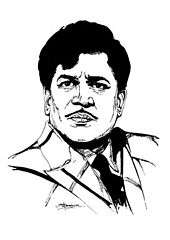M. R. Radha
| M. R. Radha | |
|---|---|
 | |
| Born |
14 April 1907[1] Madras, Madras Presidency, British India |
| Died |
17 September 1979 (aged 72) Tiruchirappalli, Tamil Nadu, India |
| Other names | Nadigavel |
| Occupation | Actor |
| Spouse(s) |
M. R. Saraswathi M. R. Dhanalakshmi M. R. Jayamal |
| Children |
M. R. R. Vasu, Radha Ravi, Nirosha, Raadhika Sarathkumar |
| Relatives | Vasu Vikram |
Madras Rajagopala Radhakrishnan Naidu (14 April 1907 – 17 September 1979), popularly known by his stage name, M. R. Radha, was an Indian film actor and politician. He was given the title of "Nadigavel" (Spearhead of acting in the meaning being frontrunner/torchbearer) by E.V.R. Periyar in a stage, for his acting prowess. After a successful career on stage in his early years, he acted in films from the 1930s to the 1970s, and then, giving up films, he went back to his first love, the stage. He is a strong person went through so many issues during the growth of his career.
Career
Radha left his home at an early age due to a quarrel with his mother in which she declined to give an extra piece of fish to eat. Radha was a popular theatre artist who performed in more than 5000 stage shows. Starting at the age of 10, he appeared at first in small roles and eventually grew to a level that stories for dramas were custom made for him.
Radha gained popularity with the success of his stage play Ratha Kanneer. His performance in the 1954 film version of the play, directed by Krishnan-Panju, brought wider recognition of his talents and made him a household name in Tamil Nadu.[2]
Radha played both villain roles and comedic roles. After the 1950s, filmmakers created roles specially for him, and he often overshadowed even main actors like MGR and Sivaji Ganesan. He was an active member of the Self-Respect Movement, and was known for his atheistic views. Towards the end of his career, however, he started acting in Hindu devotional films like Velum Mayilum Thunai but he often used to ridicule theism in these films.
Shooting incident

On 12 January 1967, Radha and a producer K.N. Vasu of Muthukumaran Pictures visited M. G. Ramachandran at his home to talk about a future project. During the conversation, Radha suddenly got up from his chair and shot twice at Ramachandran's left ear. Both bullets lodged in Ramachandran's neck. Radha then turned the gun on himself, but it just scratched his right temple. Radha and Ramachandran were admitted to the Government General Hospital, Chennai, where they survived after proper treatment.[3] The only eye witness for the shooting event was producer Vasu.
In the assassination trial, held at Saithapet First Division Magistrate Court held under Magistrate S. Kuppusami in May 1967, and later at the Chingleput Sessions Court held under Justice P. Lakshmanan, Radha was represented by eminent criminal attorney N.T. Vanamamalai. The verdict was delivered on November 4, 1967. As majority of the evidences were against Radha, he was sentenced to a seven year term. At the High Court hearing, considering his age, the sentence was reduced to three and a half years.
Death
After being released from jail, Radha died of jaundice on 17 September 1979 aged 72 at his residence in Thiruchirappalli. His popularity had improved and his funeral procession was one of the largest in South India, as over 200,000 mourners paid respect.
Personal life
He was survived by his wives M. R. Saraswathi, M. R. Danalakshmi, and M. R. Jayamamal, and his son M. R. R. Vasu, who was also a leading character artist until the mid-1980s has three sisters: Rashya, Rani and Rathikala. His other son Radha Ravi is also an actor and his daughter Raadhika Sarathkumar is an actress and producer
Filmography
- Ratha Kanneer
- Nalla Idathu Sambandham
- Aayiram Roobai
- Kai Koduttha Dheivam
- Paava Mannippu
- En Kadamai
- Chitthi
- Puthiya Paravai
- Bale Pandiya
- Sarada
- Kavalai Illaadha Manithan
- Kumudham
- Anandhi
- Karpagam
- Thayai Kaatha Thanayan
- Paasam
- Paalum Pazhamum
- Pattinathar (1962 film)
- Padithal Mattum Podhuma
- Naanum Oru Penn
- Koduthu Vaithaval
- Aalayamani
- Santhanathevan
- Velum Mayilum Thunai
- Rathinapuri Ilavarasi]]
- Thai Solli Thathathe
- Iruvar Ullam
- Petralthan Pillaiya
- Periya Idathu Penn
- Anandha Jodhi
- Ulagam Sirikkirathu
- Bhaaga Pirivinai
- Aadavantha Deivam
- Kannadi Maligai
- Hello Mister Zamindar
- Mani Osai
- Dasavatharam (film)
References
- ↑ http://www.pressreader.com/india/the-hindu/20140727/282381217678728/TextView
- ↑ T. Ramakrishnan (22 July 2005). "On Sivaji death anniversary, M. R. Radha, Kannamba remembered". The Hindu. Retrieved 21 December 2015.
- ↑ "The day M.R. Radha shot MGR". The Hindu. 23 December 2012. Retrieved 4 October 2016.